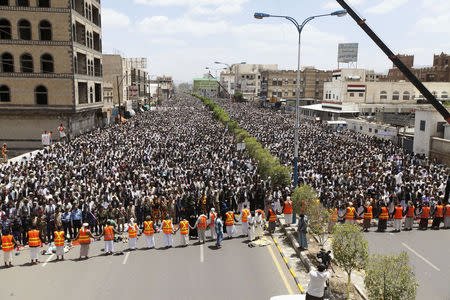Tens of thousands of Yemeni Houthis protest against govt in capital

By Mohammed Ghobari SANAA (Reuters) - Tens of thousands of Yemenis massed in the capital Sanaa on Friday in a protest called by the Shi'ite Houthi movement, which wants the government to reverse a decision on cutting fuel subsidies and resign. The rally came at the end of a week of demonstrations that have piled pressure on President Abd-Rabbu Mansour Hadi, who has struggled to keep order in the U.S.-allied country which borders major oil exporter Saudi Arabia. The Houthis have been fighting for years for more power for their Zaydi Shi'ite Muslim sect in north Yemen. Analysts say they have capitalised on anger over the subsidy cuts to bring supporters out on the streets to push to join a new government as the majority Sunni country moves towards a federal system that devolves more power to regions. Crowds gathered in a main street that leads to the airport, chanting "the people want the fall of the government". They set up tents near the interior, telecommunications and electricity ministries in a side street that leads to Sanaa's airport, saying they would stay until their demands were met - a move the government said "created a threat to security". "In light of this dangerous escalation, the (government) security and military committee is obliged to carry out its national duties to protect the security and stability of the nation," the state news agency Saba said. It added that the Houthis bore responsibility for the consequences of the escalation, without elaborating. WEST, GULF CONCERNS Representatives from the Houthis and the government had met on Thursday to try to reach an agreement to defuse tensions. "The disagreement focused on ... the Houthis' demand to set up a political party and join a new government (but) leaving out the issue of reversing a decision on fuel subsidies. The Houthis rejected that," a source in the government committee told Reuters on Thursday. Hadi has promised a more inclusive government after a new constitution is passed later this year. The country, which is also facing an insurgency by al Qaeda's most active wing, was plunged into turmoil after an uprising ousted Hadi's predecessor, veteran President Ali Abdullah Saleh, in 2012. Western and Gulf sponsors of democratisation in Yemen are keen to engage the Houthis because they have made big gains in popular support across north Yemen since the uprising and are able to bring large numbers of people onto the streets. But, alarmed by the rise in unrest, the Group of 10 ambassadors, an informal body of Western and Gulf countries and international bodies involved in supporting political reform in Yemen, wrote to the Houthi leadership, voicing concern at recent statements it described as antagonistic and militaristic. The Gulf Cooperation Council, which brokered a deal that eased former President Ali Abdullah Saleh from power, said it rejected any attempts "aimed at undermining the political process in Yemen" and condemned the "unfortunate events taking place in Sanaa and the threat of using escalating measures". Yemenis are unhappy about the government's decision to raise fuel prices in late July to cut energy subsidies to ease the burden on its budget deficit. The government spent about $3 billion on subsidies last year, nearly a third of state revenue. A previous attempt by the government to cut subsidies in 2005 led to unrest that left about 20 people dead and more than 200 wounded. The reform was cancelled. (Writing by Yara Bayoumy)

